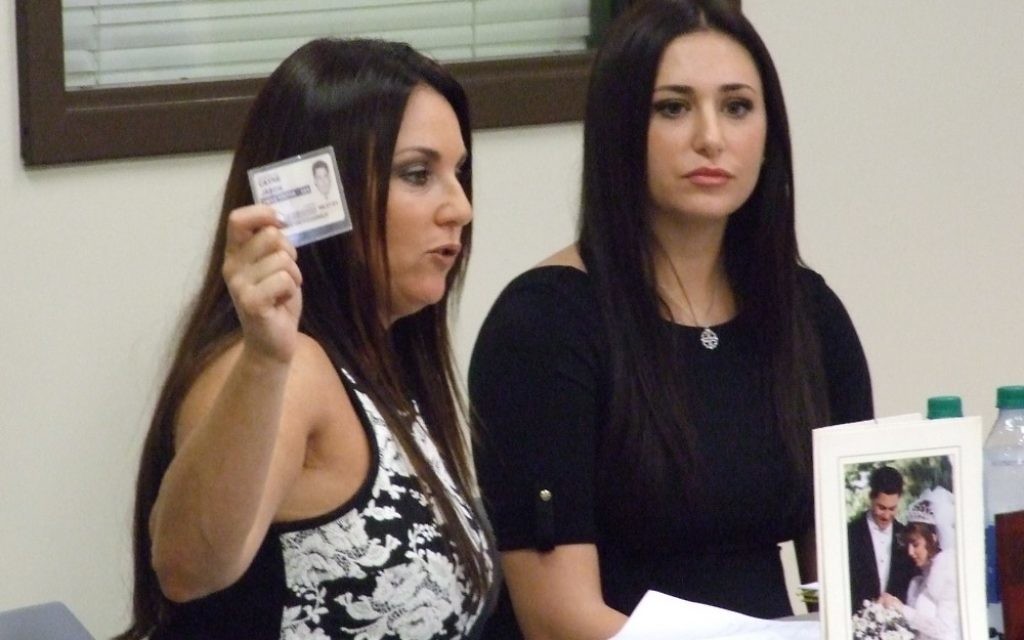9/11 Story Shows Power of Faith, Family
Above: Sitting beside daughter Suzann, Gina Cayne shows students her husband’s ID card, which was found at the World Trade Center site.
The last time Suzann Cayne heard her father’s voice, it was 8:15 Tuesday morning, Sept. 11, 2001.
With her mom, Gina, and her two younger sisters, she was at home getting ready for school. As usual, after leaving Manalapan, N.J., for Manhattan at 4:30 a.m., Jason “Jake” Cayne was in his Cantor Fitzgerald office on the 104th floor of the North Tower of the World Trade Center, and he was calling to wish his girls a good day.
Get The AJT Newsletter by email and never miss our top stories Free Sign Up
Like nearly 3,000 others Americans, Jake Cayne died that morning. He was 32. His children were 7, 4 and 20 months.
Davis Academy sixth-, seventh- and eighth-graders heard from Gina and Suzann Cayne on Friday, Sept, 2, about the shock of 9/11 and the struggle to find meaning in their lives ever since. They traveled from Florida to Sandy Springs because of their connection to Davis middle-schooler Emily Mand and her father, Brian Curtis, who edited a 10th anniversary book, “The Legacy Letters: Messages of Life & Hope from 9/11 Family Members,” with a letter Suzann wrote to her father.
The students reflected their emotional responses to the harrowing details from that horrible day and the weeks and months after, such as:
- Suzann was pulled out of school without knowing what was happening and that evening saw video of the twin towers falling. She thought it was a movie but was confident, even if it was real, that everyone inside was OK because people died only when they were old.
- She and her sisters slept that first night huddled on the foot of their mother’s bed; no one at that point knew whether Jake had escaped.
- It was on Rosh Hashanah, a week after the attack, that Gina had to face the truth when she learned that Jake’s American Express card had been found in the rubble.
- Months later, when Gina was going through life like a zombie, she hit a car in a grocery parking lot. When she delivered a check for the damage and the cars’ owners heard her story, they tore up her check and wrote her a bigger check to help the family get through.
Living amid a large Sephardic family — it was typical for 100 people to gather at her home to offer support — was crucial for the Caynes, Gina said. And because she wanted to turn tragedy into something positive, she launched a nonprofit that eventually raised and contributed more than $300,000 to families who lost a parent and were at risk of losing their homes.
“It’s a healing thing for me to help out,” she told the Davis students.
Her middle daughter is now in college; her youngest is in high school.
Suzann, now a graduate of the University of Central Florida, is pursuing a doctorate to become a psychologist specializing in family trauma, although being a witness to terrorist trials at Guantanamo Bay also sparked an interest in forensic psychology.
She told the Davis kids about the importance of her Jewish faith, although she acknowledged that her relationship with G-d was shaken.
“Of course I questioned G-d. I questioned G-d a lot. Why do bad things happen to good people? That was my biggest one. And a lot of my Judaic classes, they went over that; they explained it to me,” she said.
By ninth grade, her faith bottomed out, but her rabbi talked her through it. “I think the reason why I never 100 percent lost faith in G-d is because I needed that hope, and without G-d, I wouldn’t have had that hope.”







comments